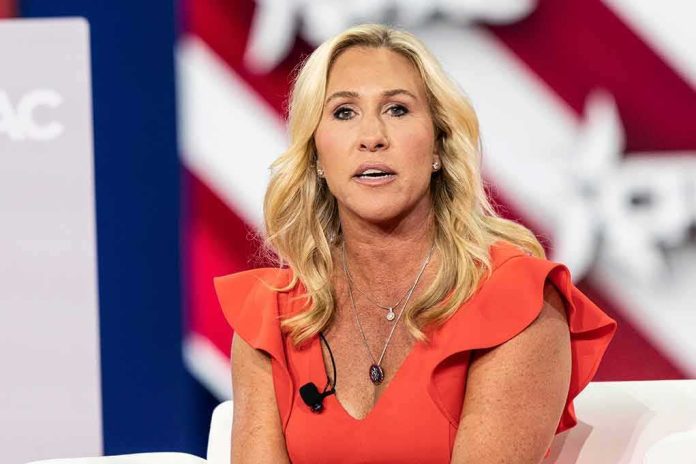
Marjorie Taylor Greene’s explosive accusations against “weak Republican men” in Congress have thrown the GOP’s internal divisions into the national spotlight, exposing a party teetering between ideological warfare and gender politics with stakes that could reshape its future.
Story Snapshot
- Greene’s public denunciation of GOP men marks a dramatic escalation in intra-party conflict.
- Gender bias allegations now intersect with urgent battles over healthcare legislation and government funding.
- Republican unity is fracturing as Greene forces leaders to confront uncomfortable questions about party priorities and inclusion.
- The fallout threatens to upend power dynamics and policy negotiations as media scrutiny intensifies.
Greene’s Attack Shakes the GOP’s Foundations
October 2025 saw Rep. Marjorie Taylor Greene transform routine legislative wrangling into a national spectacle. Her assertion that male Republicans are “weak” and afraid of powerful conservative women did more than air frustration—it weaponized gender politics inside a party already struggling to reconcile its far-right populists with establishment leaders. Greene’s criticism was not simply rhetorical. She accused GOP leadership of sidelining conservative women, citing Rep. Elise Stefanik’s failed U.N. ambassadorship bid as evidence of an ingrained bias. The timing was strategic, landing amid critical negotiations over Affordable Care Act subsidies and the threat of a government shutdown, making the party’s internal discord impossible to ignore.
Speaker Mike Johnson attempted damage control, extending Greene an “olive branch” with a prominent role in healthcare talks. Yet Greene’s scorched-earth approach left little room for compromise. Her remarks ricocheted across the media landscape, from cable news to political talk shows, fueling debate over whether the GOP’s internal fractures are rooted in ideology, gender dynamics, or both. Johnson’s defense—that efforts to include Greene are genuine—did little to quell speculation, as conservative women across the party echoed Greene’s call for recognition and advancement. The episode served as a catalyst, prompting more voices to challenge the status quo and forcing leadership to publicly address grievances previously confined to backroom whispers.
Gender Dynamics Take Center Stage in Party Turmoil
Greene’s campaign against perceived gender bias has reframed the Republican civil war. Her insistence that strong conservative women are marginalized struck a chord among colleagues and constituents alike. The GOP has a history of high-profile disputes involving women, from Liz Cheney’s ousting to Stefanik’s missed opportunities. Greene’s rhetoric—while polarizing—spotlights a persistent tension: how does the party balance tradition and hierarchy with demands for diversity and inclusion? The stakes extend beyond optics. With healthcare subsidies and government funding hanging in the balance, Greene’s challenge forces the party to confront whether its legislative priorities reflect the will of its base or the influence of entrenched leadership. As Greene and her allies push for greater agency, the party’s direction remains uncertain, with every policy debate now shadowed by questions of gender equity and ideological purity.
Media coverage has amplified the debate, with platforms like CNN and The View dissecting not only Greene’s words but also the broader implications for Congress. Pundits and scholars see parallels to earlier gender-based disputes within the party, arguing that Greene’s actions both expose and deepen existing divides. Some analysts warn that public infighting could damage GOP electoral prospects, while others suggest Greene is giving voice to legitimate grievances that must be addressed if the party hopes to retain its relevance.
Power Struggles and Policy Battles Threaten Party Unity
Greene’s confrontation has intensified power struggles among key party stakeholders. Senior GOP leaders, including Speaker Johnson, now face the dual challenge of maintaining legislative effectiveness while managing a rebellion from within. The effectiveness of outreach efforts—such as offering Greene policy influence—remains hotly debated. Greene’s supporters argue that only substantive changes in leadership and committee assignments can repair trust. Meanwhile, the looming government shutdown and unresolved ACA subsidy debates compound the urgency. The consequences of failure extend beyond Capitol Hill, threatening insurance premiums and public health outcomes for millions of Americans. Constituents reliant on these subsidies watch closely, aware that intra-party feuding could derail vital policy decisions. Political consultants and advocacy groups have begun to recalibrate strategies, anticipating further volatility as the GOP’s internal battle shows no sign of resolution.
The ripple effect is unmistakable. Greene’s campaign has emboldened other conservative women, challenged traditional hierarchies, and forced the party to reckon with its own identity. Whether these changes lead to greater inclusion or deeper division remains to be seen, but the impact on legislative outcomes and party unity will reverberate into the next election cycle and beyond.
Experts Weigh In: Ideological and Gender Fault Lines
Political analysts and academic commentators are nearly unanimous: Greene’s attacks have laid bare the GOP’s ideological and generational fault lines. Some see her denunciation of “weak Republican men” as a genuine effort to challenge entrenched gender bias, while others interpret her rhetoric as self-serving, designed to destabilize leadership and attract media attention. Scholarly perspectives suggest that Greene’s gender-based criticisms echo past intra-party disputes, but with new urgency as the party confronts existential questions about its future. Analysts agree the outcome of these battles will shape not only committee assignments and policy priorities, but also the broader perception of the GOP’s capacity to govern.
Credible news outlets and talk shows continue to provide extensive coverage, corroborating key facts and highlighting differing viewpoints. While party leadership denies intentional marginalization, Greene’s allegations have forced a rare moment of introspection, with both short-term policy impacts and longer-term shifts in power dynamics at stake. The party’s ability to resolve these tensions will determine not just its legislative effectiveness, but its place in the evolving landscape of American politics.
Sources:
SAN News: Marjorie Taylor Greene Blasts GOP Leadership Over Gender Bias

